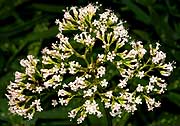Valerian Herb

We might as well give it to you straight: Valerian has an odor only a rat could love. In fact, legend has it that the Pied Piper used this very herb — more so than his hypnotic music — to lure the rodents from Hamelin. But if you can get past valerian’s unpleasant aroma, say herbalists, you might find that its natural properties have the power to lure your cares away.
The word “valerian” is thought to be derived from the Latin valere, meaning “to be healthy or strong.” Valerian is a common plant with roots having well-known medicinal properties. Valerian has been used orally for centuries as a sedative, sleep aid, antispasmodic, and digestive aid. Evidence from animal and human studies of valerian supports sedative, anxiolytic, and spasmolytic effects. The German Commission E, known internationally as a leading authority on the therapeutic use of herbs, approved the use of valerian as a sleep aid.
Evidence generally supports valerian as a safe herb. Of 28 clinical trials reviewed, no serious adverse events occurred in participants taking valerian.* Specific side effects were very rare, but included vivid dreams, headache, gastrointestinal discomfort, slight dizziness, heavy sleep, depression, paradoxical stimulation, and residual sleepiness.
Research indicated that valerian carried little to no risk of residual sedation the morning after use at doses ranging from 160 mg to 900 mg, which is an advantage in comparison to other sleep aids (benzodiazepines and diphenhydramine) for which residual sedation is a common side effect. As with any sedative, individual responses to valerian may vary.
Although residual sedation appears to be uncommon, persons taking valerian should be alerted to the potential effect and cautioned not to drive if they feel excessively sleepy the morning after valerian use.
Additionally, persons at risk for liver dysfunction should avoid the herb.
Valerian should not be taken by pregnant or lactating women, given that
one study on mice demonstrated mildly reduced fetal development.
* “Valerian use for sleep disturbances related to rheumatoid arthritis,” Holistic Nursing Practice, 1 May 2004.
|